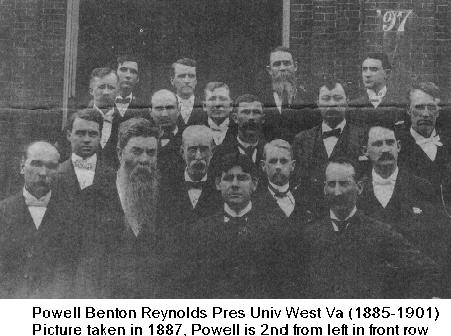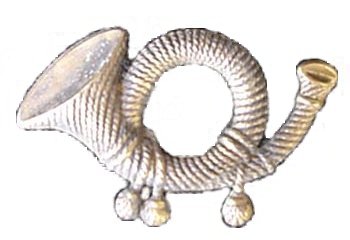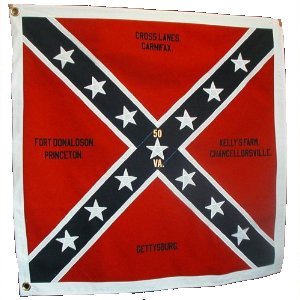|
For about a century the Reynolds name has been associated with tobacco (Richard Joshua Reynolds) and aluminum foil (Abraham David Reynolds). These two brothers started businesses that grew into the large companies we are all familiar with today. However, their cousin and my great grand uncle, Powell Benton Reynolds is a man we know little about but who made a huge contribution to our country. I am extremely proud of all my 'War Between The States', (WBTS), ancestors. My three great grandfathers served the entire war and all but one of their 35 children were born after the war ended.
Powell Benton Reynolds served the Confederacy in the WBTS, he enlisted Company D 5th Kentucky Infantry and later company K 50th VA Infantry. The 50th was organized under Capt Jefferson Thompson Lawson at Patrick Courthouse on June 22 1861. Other officers were 1st Lieutenant Martin Staples, 2nd Lieutenant W T Noel, 3rd Lieutenants Benjamin F Cloud, Asa Scott and J H Rangeley. On July 10 1861 they joined the 50th Regiment of Virginia Volunteers under command of Col. Alexander W. Reynolds. They served along with the 51st Virginia Infantry. In 1863 the 50th fought Chancellorsville and Gettysburg (as part of John R Jones' Brigade in Johnson's Division of the Second Corps). The 50th fought in Wilderness, Spotsylvania Courthouse, Lynchburg, Maryland Campaign, Richmond, and Petersburg but only a handful reached Appomattox. He was captured Autumn 1864 and imprisoned at Point Lookout Maryland, paroled 4/9/1865. He served with two of his brothers, his Father was a Captain.
After the war ended, Powell Benton started his distinguished career in education. He was a student in Richmond College 1865-1870, president of Shelton College in St Albans West Virginia 1872-1884 and pastor of Union Baptist Church in Waynesboro West Virginia 9/1879-7/1880, president of Buckner College Arkansas 1884-1885. In 1885 he went to West Virginia University as professor of English Literature, was chair of meta-physics 1889-1893, was acting president from 1893 to 1895 (refused to be president), professor of philosophy 1895-1897, professor of metaphysics and political science 1897-1901, and chaplain/professor of economics and sociology 1901-on. He wrote many letters home giving accounts of battles that were made into a book (about 1970) in the West Virginia University library.
Powell Benton's brother-in-law was my Great Grandfather Rufus James Woolwine from Stuart in Patrick County, VA. The town name was Taylorsville but changed to Stuart 11/22/1884 in honor of J. E. B. Stuart who was born on the Letcher farm nearby where his grandfather, Col. Letcher was murdered by a Tory during the Revolutionary War. Rufus James Woolwine has special mention in the Laurel Hill Farm (J.E.B. Stuart birthplace) visitors/educational instruction guide which includes writeups of only three Civil War solders. The guide states "Rufus James Woolwine was a good writer, in his youth he was 'touched by fire', and if not for Jeb Stuart he would be the most famous civil war soldier to come from Patrick County." However, I believe Powell Benton Reynolds was a more prolific writer, he wrote hundreds of letters home telling of his war experiences. The letter below to his Mother Roxanna detailing his struggles immediately after Gettysburg is reflective of the condition of our brave Southern men during the war.

----------------------------------------------------------------------------------------
Camp near Orange Court House Va.
August 7th 1863
(Right after battle of Gettysburg)
Dear Mother,
I received yours of the 26th of July yesterday morning, it having been about a week on the road. I also received one from you while we were at Hagerstown in Maryland, dated the 18th of June So first and last, I suppose I have gotten all the letters you have written. It seems that you have all the writing to do, for I get no letters from any of the rest, nor can I hear of their writing any. I suppose I shall have to excuse them up to this time, as they have all been sick, but I give them fair warning that if they do not get to writing pretty shortly now, I shall get after them. What there can be to prevent Pap, Elam, Hortense or Columbia from writing me a letter almost every week, I cannot imagine. Probably they consider that I have been somewhat slow about writing myself and therefore have no right to complain. It is true I have not written since I wrote the one of the 10th of June of which you spoke, but you must consider the circumstances under which I have been placed.
I suppose that the first thing you wish to hear about is the state of my health. I have had about as hard a time of it as I ever had in my life, but have managed to keep up so far. I stood it tolerably for the first two or three weeks after starting upon the march. But from the time we crossed the Potomac going to Maryland I could feel a perceptible difference every day until it seemed almost impossible for me to get along at all. I kept along until the day before the fight at Gettysburg, when I was so broken down that I had to get a seat in an ambulance for the first time since I have been in the army. Before going into the first I left my knapsack and all my clothes in the ambulance, for I was to weak that I could not carry them. I have not seen them since; consequently all the clothes I have in the world are on my back. I kept up with the regiment while it was supporting our batteries, but When it started upon the charge I found that I could not keep up with it. I caught up with the company shortly after the charge was over, a little after dark, and was with it through all the fighting the next day. I was not with Dozier when he was wounded nor did not see him afterwards. When we started to fall back from that place, I was compelled to throw away my gun in order to keep up. Since that time I have been able to march part of the time and a part of the time have had to be hauled. We have been resting four or five days now and I feel a little better than I have. I have fallen off until I can span my arms anywhere. I weighed 177 lbs when I left Dublin, but suppose I would weigh 135 now. But do not let this render you uneasy, for I think if I can get some rest I will recruit up again.
I would like to be able to give you all a full account of our Pennsylvania Campaign, but it would require too much time and room for this place. I must content myself with a brief sketch now and defer giving the details until I get home or get more leisure.
You have heard before this time of the part we took in the Battle of Winchester. We moved directly forward by way of Charlestown, to the Potomac, which we crossed at Shepherdstown, some ten miles above Harper's Ferry. We stayed several days near Harpsburg in Maryland lying in line of battle three or four days and nights. We could plainly see the "Stars & Stripes" floating over the enemy's works in Maryland Heights some ten miles distance. We went across Maryland by way of Hagerstown, and entered Pennsylvania at Middleburg, We took the road for Harrisburg, passing through Greencastle, Chambersburg, Shippensburg and numerous other smaller towns. We proceeded as far as Carlish, supposing all the while that we were going to attack Harrisburg, where we learned that the militia were assembling. But we about faced at Carlisie, and shortly took the road for Gettysburg, crossing the Blue Ridge. We met up with the enemy at the town of Gettysburg, and fought the greatest battle of the war. The particulars of which you have heard before now. I will just remark here that it is given up by good judges that such commanding has never taken place before in the world.
We retired from before the enemy's works on the night of the third of July, and spent the fourth lying in an open field exposed to the rain, about two miles from the town. During the night of the fourth we again commenced falling back, and continued our retreat through rain and mud until we arrived at Hagerstown. We there took a position and fortified it strongly to keep the enemy in check until the Potomac got fordable. We recrossed the river ten miles above Shepherdstown; at Williamspost Md. on the morning of the 12th of July. We had it to wade, it taking us up to the armpits. We came back to Winchester by the way of Martinsburg. We came on to Front Royal aiming, as I suppose, to recross the Blue Ridge at Manassas Gap, the way we went into the valley, but we found the Yankees there. So we went some 25 miles further up the Shenandoah and crossed near Luray. We then came by way of Madison to this place.
We have been here four or five days, expecting to move every minute. We may stay here several days yet and we may leave in half an hour. I have no idea where we will go. That is wholly dependent upon the movements of the enemy.
We are faring some better here than we have been. We have a much better chance to cook our rations and have been getting a little fruit to eat with our meat and beans. We have been getting some corn meal and bacon, which goes much better than fresh lean beef, sour at that if it has been cooked any length of time. we have been able to wash up our clothes too, and consequently we feel and look much better. I wore my shirt without having it washed from the 15th of June until the 3rd of August. It could not be helped We are all pretty ragged and a great many of us are barefooted. I have shoes now, but was entirely barefooted three days since we came back to Virginia. One day I had to march. So and being sick and tenderfooted both at once, I suffered more that day than I ever suffered in one day in my life.
The soldiers are all in bad spirits and are deserting in gangs. If matters look as dark in the country as they do in the army there is dark times indeed. Our Pennsylvania campaign has done more to dispirit and demoralize this army than anything that has occurred since the war. I knew it could only serve to discourage our soldiers and unite the enemy before it was made. But I am really sorry that so many are deserting.
If there is not a stop put to it, it will ruin both the army and country. I learn that the mountains up in our country are full of runaways. It is too disgraceful! Some are too ready to give up. It is a gloomy time, but there has been darker times, and light yet came. I do not doubt our ultimate success, and will hang on to the best.
I was really sorry to hear that you are were having so hard a time with sickness, and am really glad to hear that you all have gotten through safely. I am glad to hear that you all have a pretty fair crop, for what you do not produce you will have to do without. You fairly made my mouth water speaking of your vegetables in yours of the 18th of June. I am afraid though that I shall not be there to help eat them. Tell my little brothers that I am glad to hear they are industrious and I hope they will behave well. Nearly all I think about of late is getting back home and having a good peaceable time studying and working with them. Tell Pap that I have been keeping 50 dollars for him and Grandpa a long time but have had no chance to send it. Tell Grandpa that I hope to get to talk over these war matters with him in peace one of these days yet. Give my respects to the girls and tell them to write to me. Clum and Hortense and Columbia must write. I wrote to Pyrrbus the other day, and sent my respects to Oliver. Uncle
Henry is well. I would like to know if Dozier has gotten home yet.
Your affectionate son,
P. Benton Reynolds
----------------------------------------------------------------------------------------
NOTE: "Dozer" mentioned in this letter is Powell's uncle, Indiandozer Boganshield Shelor (1828-2/16/1865). He was wounded 15 July 1863 along the line of retreat from Gettysburg. On 12 May 1864 he was captured in the Battle of Spotsylvania Courthouse. He was at POW Point Lookout from 18 May 1864 to 30 July 1864, then at Elmira, New York, from 2 August 1864 to 16 February 1865 when he died from starvation and exposure. He is buried in Elmira, New York at Marker # 1818, J. Sherlor, Co. K, 50 VA Reg, CSA. He signed his name I.B. a lot in his letters and apparently the "I" was confused with "J" in his military records. Elmira death records list him as "Sherlor, J", his last name was also misspelled.


HISTORY:
The Virginia 50th Infantry
Regiment was organized with 10 companies and 3 cavalry companies for one year on July 3, 1861.
Cavalry Compnay B mustered out on September 26, 1861.
Cavalry Companies A and C became Companies A and B, 8th Virginia Cavalry Regiment, respectively, in October 1861.
Company L organized on October 7, 1861, and transferred to the 23rd Infantry Battalion on January 15, 1862.
Regiment organized with nine companies on May 25, 1862.
The 2nd Company G organized on August 26, 1862.
Field consolidation with the 21st, 25th, 42nd, 44th, and 50th Infantry Regiments from May 14, 1864, prior to July 9, 1864.
Dispersed at Waynesborough on March 2, 1865.
OFFICERS:
Commander: Alexander W. Reynolds (Colonel)
Colonels: Thomas Poage and Alexander S. Vandeventer (Lt. Col., Col.)
Lieutenant Colonel: William W. Finney and Logan H.N. Sayler
Major: Lunville J. Perkins and Charles E. Thorburn
ENGAGEMENTS:
Carnifax Ferry ..... [September 10, 1861]
Fort Donelson ..... [February 12-16, 1862]
Kanawha Campaign.....[September 1862]
Kelly's Store ..... [January 30, 1863]
Blackwater River ..... [January 30, 1863]
Gettysburg ..... [July 1-3, 1863]
Bristoe Campaign ..... [October 1863]
Mine Run Campaign ..... [November-December 1863]
The Wilderness ..... [May 5-6, 1864]
Spotsylvania Court House ..... [May 8-21, 1864]
North Anna ..... [May 23-26, 1864]
Cold Harbor ..... [June 1-3, 1864]
Lynchburg Campaign ..... [June 1864]
Monocacy .....[July 9, 1864]
Fisher's Hill ..... [September 22, 1864]
Cedar Creek ..... [October 19, 1864]
Waynesborough ..... [March 2, 1865]
|


